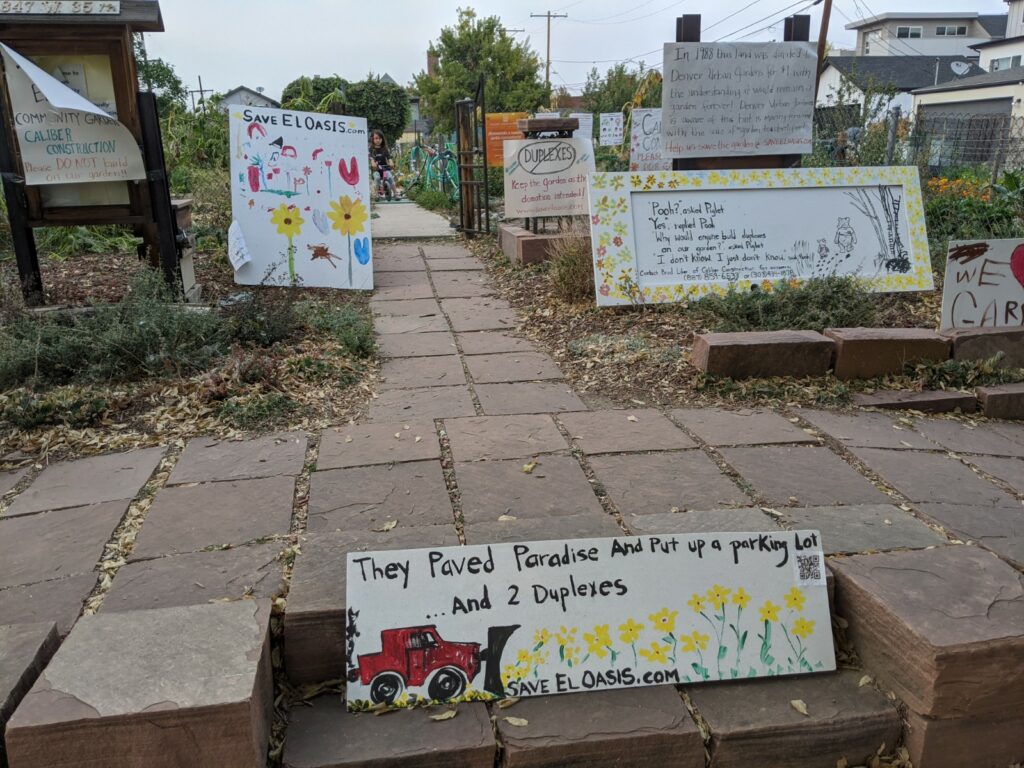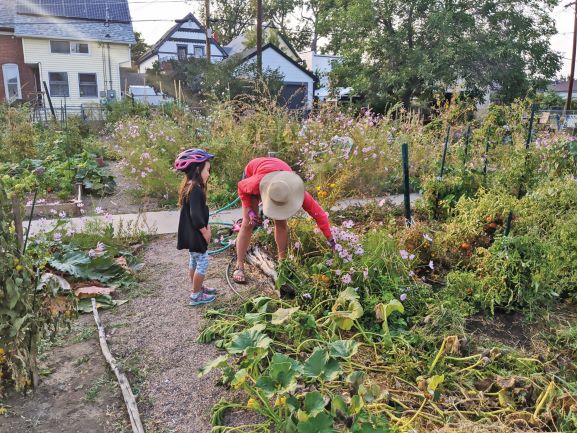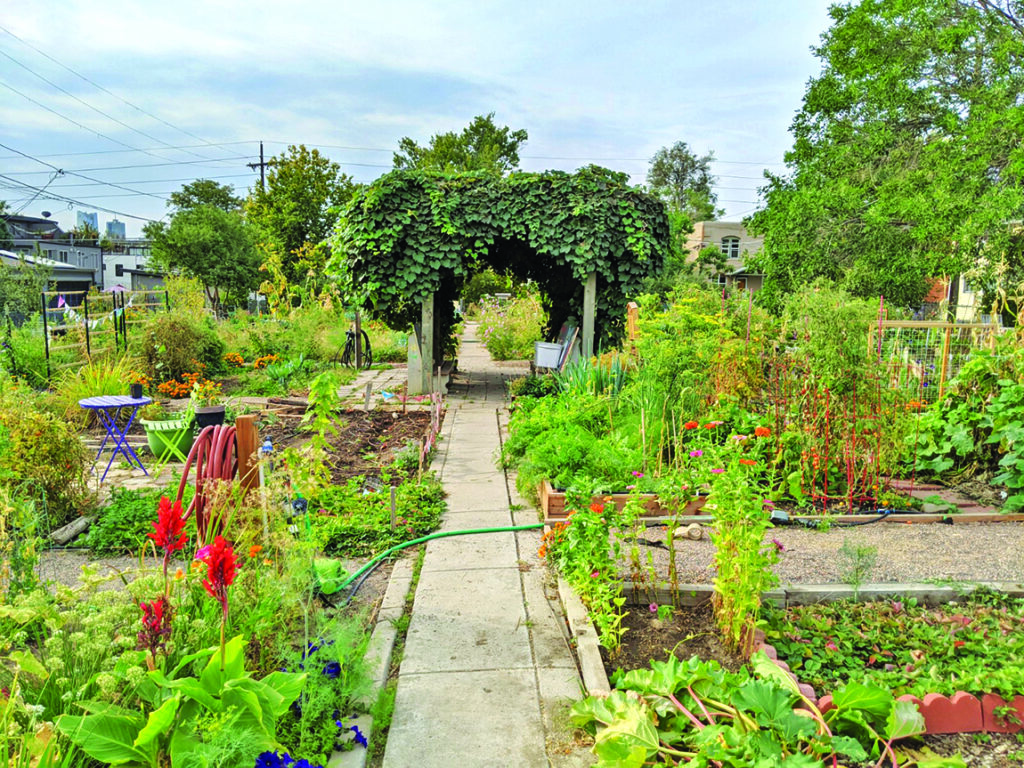Denver Urban Gardens Selling Community Garden, Says Organization Will Close if They Don’t

Andy Karsian has been gardening at El Oasis for 16 years and isn’t going to give up his plot without a fight. “This is a community that wants to save the last piece of undeveloped land in the neighborhood.”
Karsian and other gardeners were shocked to learn that the El Oasis was being sold to a developer. They were more shocked to learn the deal was already inked when they were told. Denver Urban Gardens (DUG), a nonprofit organization based in Denver, operates more than 180 gardens in the metro area, including El Oasis on 35th Avenue in the Highland neighborhood, one of their largest and oldest.
“This was not a decision that was made lightly,” said Ramonna Robinson, board chair for DUG and a North Denver resident. “It’s not a decision that anyone wants.” Robinson said while approximately 2/3 of the land will be sold, the remaining 1/3 will be preserved as a garden.
The sale, according to Robinson, is to pay off a $500,000 line of credit for which the land was used as collateral. She explained that the organization has been struggling financially and the sale is their last resort for stabilizing their organization. Over the last few years, they’ve lost grant funding they couldn’t make up with private or corporate donations, with their debt increasing for most of the last decade. “If this sale doesn’t close, Denver Urban Gardens will cease to exist,” added Robinson.
That news was also surprising to several of the gardners interviewed, who expressed frustration that the organization continued to grow and bring on additional projects without secure funding, putting existing projects at risk. Several said the organization’s leadership never approached members about the situation they were in, saying if they had done so members would have stepped up to help more. Others questioned the doomsday messaging that the sale must be done immediately.
“It was like being pushed off a cliff,” said Karsian, frustrated that members had “no opportunity to engage in alternative options.”
Asked if she believes DUG handled the situation appropriately, Robinson said “Hindsight is 2020 on anything like that. Knowing how emotional this is for the gardners, I don’t know when the right time would have been.”
A $1 Sale and a $1.2 million Sale

Rohn Hyde worked as a developer in North Denver during the 1980s. He purchased the land for approximately $65,000 and was interested in building senior housing, but, after the city wouldn’t approve the project he wanted, decided to give back to the community that he worked in by donating it as public space to the new, fledgling organization. He sold the land to Denver Urban Gardens for $1.
While Hyde, now 71, has not granted media interviews, he did record a question and answer session with North Denver realtor and DUG gardener Jim Rodriguez. Hyde said that when he donated the land, DUG told him it would remain a garden in perpetuity. That conversation was a handshake agreement though and never written down. Hyde said that as a young man he trusted DUG and the conversations they had about the land.
Robinson responded to a question about the land’s legacy, saying “The board members and the organization’s executive director did not know about that previous sale. We’ve only been made aware of it 2nd or 3rd hand by the gardeners. We had a deed to the property we were operating from.” Knowing where the land came from and the previous owner’s intent, however, does not change her view. “We are in a legally binding contract. The seller has no opportunity at this point to break the contract,” but then added that the deal wasn’t closed.
Asked his feelings about it being sold, Hyde said “Disappointed. Disbelief. And mostly…why would the board members pick a location that is so obviously utilized by many to clean up their mess?” Regarding DUG’s financial situation, Hyde said “I have no sympathy for the board, for the organization” and also questioned how they could have gotten into such a deep hole. He also took offense to what he called the “under the table approach to the sale.”
That “under the table approach” raised eyebrows from members, including Rodriguez who has worked as a real estate broker for 16 years. The property was never publicly listed. Rodriguez said that if the board’s goal was to make as much as possible they should have brought it to market instead. In his professional opinion, the $1.2million sale is actually below market value. He believes they could have sold the land for $1.4 or even $1.6million if other developers had a chance to bid. He also believes that if it had been listed publicly they might have found a socially conscious buyer or buyers who would purchase the land and keep the garden intact.
Robinson defends the quiet sale, saying that they made the agreement shortly after the COVID pandemic started and they were concerned land values could drop or buyers wouldn’t be as quick to purchase land. “We were in the process of selecting a listing agent,” when word of mouth found them a buyer who came in “close to our appraised value.”
The developer, Caliber construction, did not reply to a request from The Denver North Star or other publications who have covered the controversial sale in recent weeks. The company is planning on building two duplexes according to several people close to the situation.
Short Term Fix or Long Term Solution?
Another piece of the conversation is whether the sale, which is roughly double the debt the organization has, will create long term sustainability or whether other community gardens might be on the chopping block in a few years. DUG owns 7 of the gardens they manage, 3 of which are in NW Denver. One of those, located on Pecos, is currently being used as collateral, but Robinson said the organization has no plans to sell it and believes the El Oasis sale will put the organization on more sound footing. The El Oasis gardeners, however, aren’t convinced and hope that if they can’t stop this sale they can at least raise awareness to stop what they see as an inevitable sale down the road.

Some gardeners in the network do believe the sale can be a long term stabilizer though. Sarah Muntz is a former Highland neighborhood resident now living in Platte Park. She started gardening with DUG in 1996 and, after a break, came back as a garden leader at the Rosedale garden in 2005. She said she understands the feelings of the El Oasis community but believes it’s needed. “I would be completely crushed if that were my neighborhood and that was happening,” said Muntz. “I understand their heartbreak. I also know what DUG brings to community gardening in Denver. If this is a matter of life or death for the organization, which it is, I can understand how they made this supremely difficult decision.” She said the longer she was with the organization the more she understood the tough decisions they had to make, noting that the organization delivered 65,000 pounds of food to food relief organizations in a single year. “Look at the greater good,” said Muntz.
At the end of September, the organization’s Executive Director resigned. An email obtained by The Denver North Star between the outgoing ED and a member who was against the sale implies her opposition to the sale. “I tried…The board said no. So I’m resigning from my position today. Know that I heard you loud and clear.” the email reads.
The DUG board declined to comment on the reason for their ED’s departure, sending a note thanking her for her service to the organization.
Done Deal or Community Fight?
While the gardeners are hoping to stop the sale, they also know their options are limited. Signs in the community encourage supporters to contact Councilwoman Amanda Sandoval, the DUG board, and Caliber Construction, but there’s dwindling options for the opponents to stop the sale.
Councilwoman Sandoval said her office has received calls about the pending sale but since it is a private transaction between two parties and, since the builder is not currently seeking any zoning changes, there’s essentially no role for the city to play. “I wish I had known about their hardship [earlier]. It’s been such a great organization,” said Sandoval, adding she only learned of the sale a few days before it was public. “It’s a loss,” she lamented.
According to Robinson and the DUG board, they are in a binding contract with the buyer and said only Caliber can withdraw at this point, explaining the sale is likely to be finalized early December.
That leaves Caliber Construction and a PR campaign some gardeners have started encouraging them to withdraw to give garden advocates time to find an alternative. Rodriguez hopes the company will hear the outcry from the community. “Caliber is not the enemy, but they can be the savior,” he said, noting that the DUG board has said there’s still time for Caliber to back out of the deal. “There’s a court of law and court of public opinion,” adding that the sale is “legal, but morally despicable.”

Be the first to comment